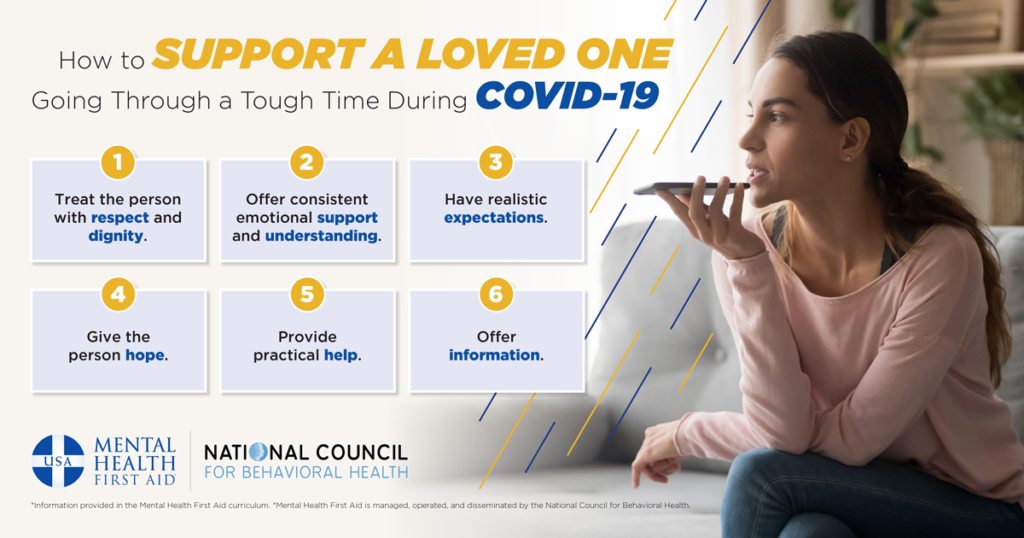By Mental Health First Aid USA on March 20, 2020
Updated on: August 23, 2021
If you or someone you care about feels overwhelmed with emotions like sadness, depression or anxiety, or like you want to harm yourself or others call 911.
You can also contact the Substance Abuse and Mental Health Services Administration’s (SAMHSA) Disaster Distress Helpline at 800-985-5990, the National Suicide Prevention Lifeline at 800-273-8255 or text MHFA to 741741 to talk to a Crisis Text Line counselor.
Isolation from friends and family, job loss and death are challenges we’re all facing during these days of COVID-19. You are not alone. COVID-19 is affecting families across the world.
We encourage you to stay connected with your loved ones while practicing physical distancing. It’s important that you support one other during this difficult time, especially if your loved one may be facing a mental health concern.
Use tips from the MHFA curriculum to reach out to someone who might need you.
- Treat the person with respect and dignity. Listen nonjudgmentally, and respect the person’s privacy and confidentiality.
- Offer consistent emotional support and understanding. In difficult times, we all need additional love and understanding. Remember to be empathetic, compassionate and patient.
- Have realistic expectations. Accept the person as they are. Tough times can make it harder than usual to do everyday activities like cleaning the house, paying bills or feeding the dog.
- Give the person hope. Remind your loved one that with time and treatment, they will feel better and there is hope for a more positive future.
- Provide practical help. Offer help with overwhelming tasks, but be careful not to take over or encourage dependency. For example, offer to bring groceries over.
- Offer information. Provide information and resources for additional support, including self-help strategies and professional help.
Several tips for what not to do are:
- Don’t tell someone to “snap out of it” or to “get over it.”
- Don’t adopt an overinvolved or overprotective attitude toward someone who is depressed.
- Don’t use a patronizing tone of voice or a facial expression that shows an extreme look of concern.
- Don’t ignore, disagree with or dismiss the person’s feelings by attempting to say something positive like, “You don’t seem that bad to me.”
Many health professionals believe self-help strategies can be helpful when you’re feeling depressed or anxious. It is a good idea to discuss the appropriateness of specific strategies with a mental health professional. Some strategies include:
- Self-help books based on cognitive behavioral therapy (CBT). Researchers have sought to develop a CBT-based guided self-help intervention that may prove useful for adults with intellectual disability in addition to depression or other mental health challenges for which CBT has been shown to be helpful.
- Computerized therapy. Self-help treatment programs delivered over the internet or on a computer; some are available free of charge.
- Relaxation training. Teaching a person to relax voluntarily by tensing and relaxing muscle groups; some programs are available for free online.
- Complementary therapies. Scientific studies of complementary therapies such as acupuncture, meditation, mindfulness, yoga, exercise and dietary supplements have shown that these therapies do make a difference for depression.
If you’re still not sure what to do, reach out to your primary care physician. This person can help you with determining the best next steps for mental health support strategies, resources or treatments. Thank you for choosing to #BeTheDifference for yourself and your loved ones during this difficult time.

